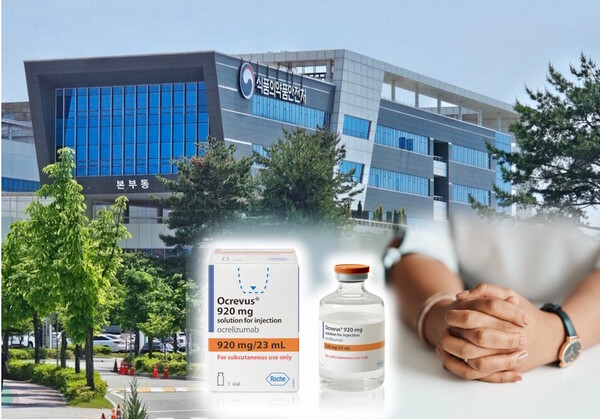Ocrevus (ocrelizumab), a high-potency treatment for multiple sclerosis, is evolving from intravenous (IV) to subcutaneous (SC) injection, improving both treatment efficiency and patient convenience.
The Ocrevus SC formulation, which can replace two to three hours of medication with a 10-minute injection, is a new treatment option that dramatically reduces treatment fatigue and time for patients, also easing the burden on hospital systems.

Multiple sclerosis impairs quality of life, leaves grave socioeconomic effects
Multiple sclerosis is a chronic disease in which the myelin sheath in the central nervous system, including the brain, spinal cord, and optic nerves, is damaged due to immune system abnormalities, causing a variety of neurological symptoms. The number of patients in Korea was 2,647 in 2022. Although it is a rare disease, people in their 20s and 40s account for more than 62 percent of the total, and the proportion of female patients is 65 percent.
The main symptoms vary widely, including sensory loss, muscle weakness, vision impairment, and gait disturbances, and are characterized by a course of relapses and remissions. Especially in the early stages, the symptoms are not obvious, so the risk of misdiagnosis is high, and diagnosis is often delayed.
In addition to physical disability, MS can also cause mental burdens, such as cognitive decline and depression. Only 8 percent of people with advanced MS can work, a stark difference compared to healthy adults (82 percent). The socioeconomic costs of early retirement, medical expenses, and caregiver burden are significant.
Caregivers spend an average of 6.5 hours a day on caregiving, which impacts many aspects of their lives, including employment status. It is a “life-altering disease” for both patients and caregivers.
Ocrevus was the first treatment approved by the U.S. Food and Drug Administration (FDA) in 2017 for both relapsing multiple sclerosis (RMS) and primary progressive multiple sclerosis (PPMS). In Korea, the intravenous (IV) formulation was approved in May 2024, and reimbursement for RMS patients began in March of this year.
Ocrevus inhibits myelin damage and inflammatory responses by selectively eliminating CD20-expressing B cells. It has demonstrated efficacy in multiple global phase 3 clinical trials in RMS and PPMS, including OPERA I/II and ORATORIO, reducing the risk of annualized relapse rate (ARR) and disability progression, and a 10-year long-term study confirmed its disease progression control and safety profile.
To date, it has been approved in more than 100 countries worldwide across the U.S., Europe, the Middle East, and Asia, benefiting more than 400,000 people with MS.
Ocrevus SC formulation reduces treatment time from three hours to 10 minutes
The existing Ocrevus IV formulation is administered intravenously once every six months, taking an average of 2.5 to 3.5 hours. In contrast, Ocrevus SC can be injected into subcutaneous tissue in less than 10 minutes, significantly reducing the time spent in the hospital. This can improve access to care for patients with mobility limitations and save hospital resources.
Ocrevus SC is formulated with Halozyme Therapeutics' “ENHANZE” technology, which utilizes the enzyme hyaluronidase to temporarily increase the permeability of subcutaneous tissue to the drug, resulting in improved absorption.
Results from the OCARINA II study demonstrated pharmacokinetic non-inferiority and equivalent safety and efficacy of the SC formulation compared to the IV formulation, with no new safety issues identified.
Ocrevus SC is expected to be particularly beneficial for patients with mobility impairments or who have difficulty staying in the hospital for extended periods. It will reduce the burden of dosing time, travel time, and waiting time experienced by both providers and patients.
In particular, patients with primary progressive MS (PPMS) represent only 10-15 percent of all MS patients, but they are at the highest risk for rapid disease progression and disability accumulation. It is also significant that Ocrevus is the only licensed drug for the treatment of PPMS, as there are currently no available treatments.
Ocrevus SC was approved by the European Medicines Agency (EMA) in June 2024 and by the U.S. Food and Drug Administration (FDA) in September of the same year. It is currently licensed and used in more than 40 countries worldwide, including Switzerland, the United Kingdom, and Australia.
As a result, patients and experts in Korea are excited about the Ocrevus SC formulation. With limited options for high-potency drugs, Ocrevus SC is a treatment option that can improve quality of life and treatment adherence for patients.
"We are working closely with the Ministry of Food and Drug Safety (MFDS) to bring Ocrevus SC to Korea, and we will do our best to provide patients and healthcare providers with a new treatment option as soon as possible," said a representative from Roche Korea.

